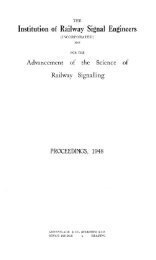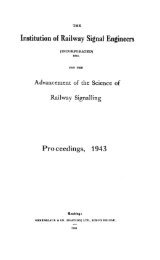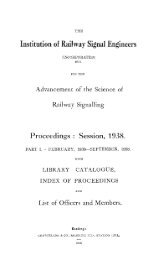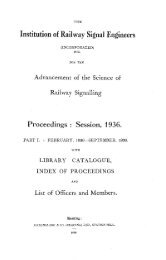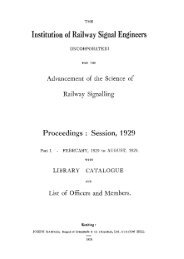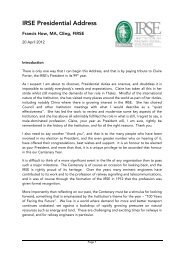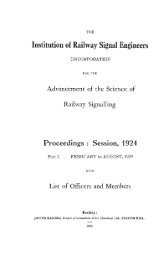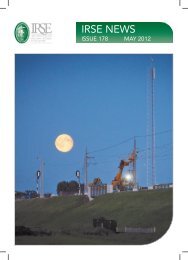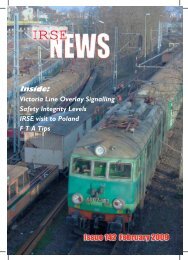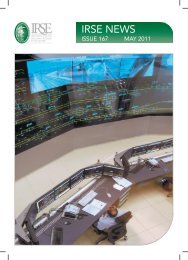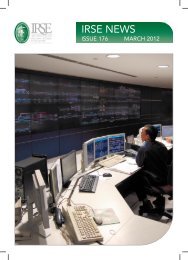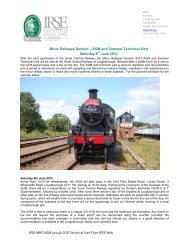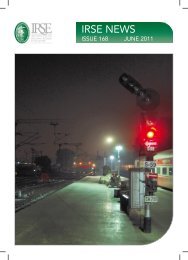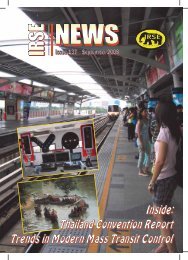IRSE News 140 Dec 08.pdf
IRSE News 140 Dec 08.pdf
IRSE News 140 Dec 08.pdf
You also want an ePaper? Increase the reach of your titles
YUMPU automatically turns print PDFs into web optimized ePapers that Google loves.
Institution of Railway Signal Engineers<br />
Dutch <strong>IRSE</strong> Merit Award<br />
During the Bangkok Convention this year, an<br />
<strong>IRSE</strong> Merit award was presented to Henk<br />
Scholten. Henk has been very supportive and<br />
active, in his own inimitable way, of setting up<br />
the Dutch section and has been an active<br />
member of the Convention 2007 organising<br />
committee. In particular, he has been<br />
relentless in persuading colleagues throughout<br />
the Dutch signalling community to become<br />
members of the <strong>IRSE</strong>. Many of the new Dutch<br />
members that have joined over the last three<br />
years may have done so as a last resort to get<br />
Henk off their case.<br />
Henk should already have retired but chose<br />
to do so a few years later, among other more<br />
personal reasons, to be able to see the Dutch<br />
convention and the section come to fruition.<br />
This year Henk has retired, and in fact his contract expired the day before he returned home from the Bangkok convention. But<br />
as these things go, at present Henk has been retained by ProRail in an effort to capture and record his vast knowledge of Dutch<br />
signalling systems and projects.<br />
Wim Coenraad<br />
<strong>IRSE</strong> Discussions on the Web<br />
One of the benefits the <strong>IRSE</strong> offers its members is the ability<br />
to network with colleagues in the supply, railway and<br />
consultancy fields, whether at a technical meeting, a<br />
seminar or during the international convention. Modern<br />
technology now extends these possibilities to the Web and that is why we have<br />
started trialling a number of new ideas that eventually might become part of the<br />
<strong>IRSE</strong>’s website and other official web presence.<br />
The first is an <strong>IRSE</strong> members-only group on LinkedIn (http://www.linkedin.com<br />
/home). LinkedIn is a website primarily aimed at networking for professionals.<br />
Through links to colleagues you can find contacts in all parts of the world and<br />
industry, asked to be introduced, get a recommendation from someone you have<br />
worked for or with etc. Increasingly LinkedIn forums such as Rail Professionals are<br />
being swamped with job offers by recruitment agencies and that is why we have<br />
started a forum for <strong>IRSE</strong> members only.<br />
If you would like to engage in more technical discussions or discuss matters<br />
relating to the <strong>IRSE</strong>, the sections and their activities and policies, you might want to<br />
take a look at a discussion group that is presently hosted by Google. The <strong>IRSE</strong><br />
discussion group (http://groups.google.nl/group/irse) is also a closed user group,<br />
allowing us to have our discussions “amongst ourselves” without them showing up in<br />
search engines etc. If you want to participate, all it takes is to register your e-mail<br />
address with a Google groups account and to apply for admission to the discussion<br />
group, quoting your membership number and grade to facilitate the moderator’s task<br />
in admitting you. Two council members already participate in the group, so this is an<br />
excellent way to make your voice heard. Dutch speaking members may also be<br />
interested to note that a discussion group aimed at the Dutch signalling community<br />
(http://groups.google.nl/group/irse-nederland).<br />
Wim Coenraad<br />
VOCATIONAL QUALIFICATIONS<br />
EVOLUTION<br />
Many of us in the UK have grown up with<br />
qualifications such as ‘O’ Levels, GCSEs<br />
and National Vocational Qualifications<br />
(NVQs). The last one was introduced to<br />
get recognition for those who<br />
demonstrated competency for doing<br />
skilled jobs in industry. They are our<br />
vocational qualifications and we have<br />
them in signal engineering.<br />
There are Government led initiatives<br />
underway to reform the vocational<br />
qualifications landscape in UK. The aim<br />
of the initiatives is to promote more<br />
recognition for all learning, to make<br />
qualifications more flexible and to<br />
improve the qualifications system.<br />
Central to the reform of qualifications<br />
is the introduction of new credit frameworks.<br />
The new credit frameworks<br />
attach credit to units (chunks) of<br />
achievement and these are then used to<br />
make up qualifications. The credit value<br />
is assigned on the amount of learning<br />
that has to go into the unit to show the<br />
learner has achieved.<br />
Continued over page<br />
<strong>IRSE</strong><br />
NEWS Issue <strong>140</strong> November 2008 23



